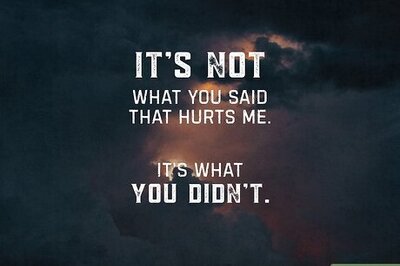
views
Amar Kaushik’s Stree is laden with quirky one-liners and cutting retort. The supernatural horror-comedy is not one that is realised on a larger-than-life canvass, yet manages to charm us into the world of obscure individuals with deftness and rib-tickling humour. Dialogue writer Sumit Aroraa was the mainstay behind all the amusement that kept us engaged throughout the film, and its characters Vicky (Raj Kumaar Rao), Rudra (Pankaj Tripathi), Jana (Abhishek Banerjee) and Bittu (Aparshakti Khurana) some more.
In an era where dialogue-driven comedy in films is neck to neck with slapstick, making a niche for oneself, and the film, becomes a grinding task. The situation is exacerbated when the dialogue writers are asked to pen lines for not just one or two primary characters (the hero and the villian), but an ensemble of a cast who carries the film forward, in equal measures.
Sumit says that since the narrative in popular films, especially today, hinges more and more on secondary and tertiary characters, his task has evolved accordingly. "Most of our mainstream films used to be larger than life until the mass audience started to warm up to the realistic middle of the road films. People used to love watching a hero fight against a villain along with delivering punch lines. Dialogue writers were required to write iconic lines for the hero or the villain which would further accentuate their image as a hero or villain. Lines such as Don Ko Pakadna mushkil hi nahin, namumkin hai; mogambo khush hua are a prime examples of that. These were primarily star driven films.”
“The role of a dialogue writer is completely reversed in a film where the narrative is driven by characters. You are required to create a character through dialogue. Every character along with the main protagonist needs to have a definite dialect that reflects his/her surroundings.
The challenge is to create interesting memorable dialogue while not losing out on the believability factor.”
What about iconic and heroic dialogues then? Sumit adds, “You can think of an extremely iconic line but if it doesn't go with the character, it will look out of place. 'Vicky pleej' from Stree has become a catchphrase but it's such a simple line. It works because how three friends sit and talk about it in that restaurant scene. The only way to make a line iconic in such films is to stay true to the character and the milieu.”
Dialogue writing is an essential part of cinema ever since sound was amalgamated with the moving image. In fact, it is as significant as the image itself in drawing us closer to the unreal reality of motion pictures. Dialogue exerts such cultural influence on our psyche that one proudly passes off among their mates while he/she recollects or mumbles some of the famous filmy lines.
On being asked how to create small, endearing worlds of characters through dialogues, Sumit says, "Dialogue should instantly transport you into the world of the story. Also, different individuals talk about one certain issue in different ways because their head space is occupied by their own issues and concerns. Once you get the interiority of the characters right, it becomes easy to carve out the exterior as well.”
"Ek baar character ka dimaag samajh aa gaya toh zubaan apne aap pakad mein aa jaati hai," he adds.
But behind filming, how much of a collaboration is required for the vision of a dialogue writer to translate on screen, with authenticity and ease? Sumit says that a dialogue writer’s relationship with the director and actors is very intimate and like no other. “Compatibility between a writer and director is as important as compatibility between a husband and wife. If both are not in sync, the marriage won't work. It's not easy for a writer to find a director who understands every nuance of his/her writing.”
About Stree’s director, Sumit says, "Amar Kaushik and me have known each other since many years and have interacted many times creatively. He understood the rhythm of each and every word used in the dialogue so well that it fully matched the way I had imagined it playing out in my head. There can not be a better joy for a writer than that."
On collaborating with the actors he says, "I also like to be on the set so that you can incorporate on spot changes into the script smoothly. I was on set when Stree was being shot in Chanderi. The good part about having such a great bunch of actors is the amount they bring to the table. Sometimes the actors would have their inputs on some lines but it was my job to match it with the tone of the film and also to think it through so that it works in the script holistically."
Sumit’s stepped up to the enviable task of dialogue writing when he delivered the humour, ingrained in the characters, with subtlety and wholesome innocence. He is also in the running for Best Dialogues trophy at the upcoming News18 Reel Movie Awards 2019.
He is pleased with the recognition that followed in the wake of the film’s release and is excited over being nominated. “It always feels good when your hard work is appreciated. It makes all those hours in front of your laptop screen worth it. It also inspires you to work harder. It's such a joy to be part of a nominee list with other talented writers of films like Mulk, Badhaai Ho, AndhaDhun and Raazi.”
Sumit reiterates his passion and stance on writing when he advises aspiring dialogue writers to-- “Sit down and write.”
Follow @News18Movies for more


















Comments
0 comment